We may not have the course you’re looking for. If you enquire or give us a call on +44 1344 203 999 and speak to our training experts, we may still be able to help with your training requirements.
Training Outcomes Within Your Budget!
We ensure quality, budget-alignment, and timely delivery by our expert instructors.
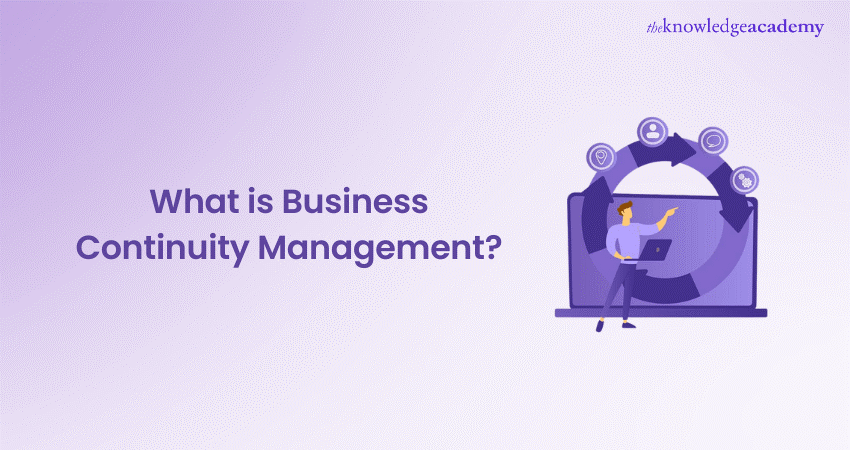
Business Continuity Management (BCM) is a game-changer for businesses aiming to thrive and endure. But What is Business Continuity Management exactly? At its heart, it’s a strategic and operational framework that equips organisations to anticipate and tackle disruptive events that could throw a wrench in their operations.
The essence of BCM is to build organisational resilience. By proactively planning for potential crises, businesses can face unexpected challenges with confidence. In this blog, we’ll shed light on the question What is Business Continuity Management and uncover why it’s indispensable in today’s dynamic business world.
Table of Contents
1) What Is Business Continuity Management?
2) The Importance of Business Continuity Management
3) Key Elements of Business Continuity Management
4) Phases of Business Continuity Management
5) Difference Between BCP and BCM
6) Conclusion
What Is Business Continuity Management?
Business Continuity Management provides a strategic framework that helps organisations plan for and respond to unforeseen disruptions. This involves identifying risks, assessing their impact, and implementing measures to ensure the continuation of critical business activities.
BCM aims to minimise the impact of disruptive events on key assets and ensure an effective recovery process. Proper planning and testing of contingency measures enhance organisational resilience, protect reputation, and maintain customer trust. Effective BCM strengthens a business's capacity to face crises and emerge stronger.
The Importance of Business Continuity Management
An effective BCM plan is crucial for ensuring continued operations in today's fast-paced business environment. Here's how BCM plays a vital role in business operations, reputation, and compliance:
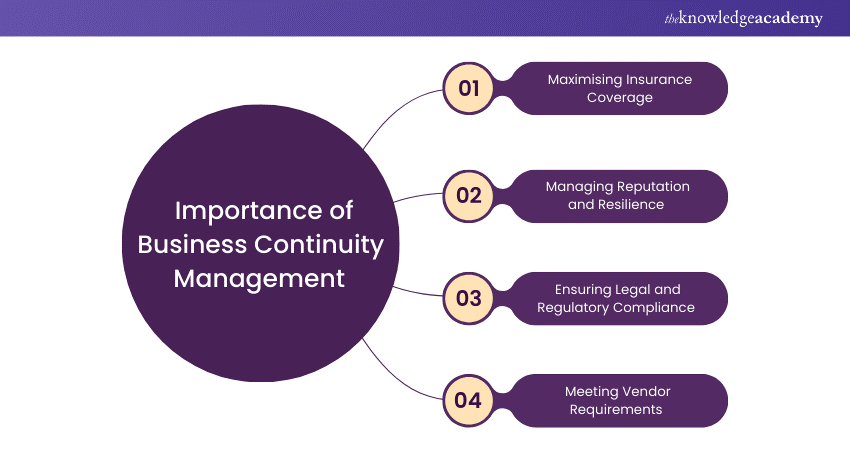
1) Maximising Insurance Coverage
In today’s uncertain business environment, Business Continuity Management is essential. A key aspect of BCM is ensuring maximised insurance coverage, providing a strong defence against severe risks.
By addressing individual needs and exposures, businesses can protect themselves from financial devastation and recover quickly after a disaster. A well-implemented BCM strategy optimises insurance coverage, enabling organisations to navigate uncertainties with confidence and emerge stronger.
2) Managing Reputation and Resilience
BCM safeguards an organisation's reputation and builds resilience against risks such as natural disasters and cyber-attacks.
An effective BCM strategy involves identifying risks and implementing contingency plans to mitigate their impact. Through careful planning, regular testing, and a culture of preparedness, BCM ensures long-term sustainability and success.
3) Ensuring Legal and Regulatory Compliance
BCM is crucial for organisations of all sizes, ensuring compliance with laws and regulations, protecting operations, reputation, and financial standing.
Robust BCM strategies help businesses navigate disruptions, minimise downtime, and maintain continuous service delivery. This fosters trust with stakeholders and demonstrates responsible business practices for long-term success.
4) Meeting Vendor Requirements
BCM enables organisations to anticipate and prepare for disruptions, meet vendor requirements, protect essential supply chains, reduce downtime, and maintain customer confidence.
Effective BCM strategies enhance a company's resilience, reputation, and competitiveness. Through contingency planning, regular testing, and review, BCM equips businesses to weather challenges and emerge stronger.
Master Business Continuity planning and join Business Continuity Training today!
Key Elements of Business Continuity Management
BCM consists of several key elements that help organisations sustain operations, reduce losses, and recover quickly from disruptions. Let's explore these elements:
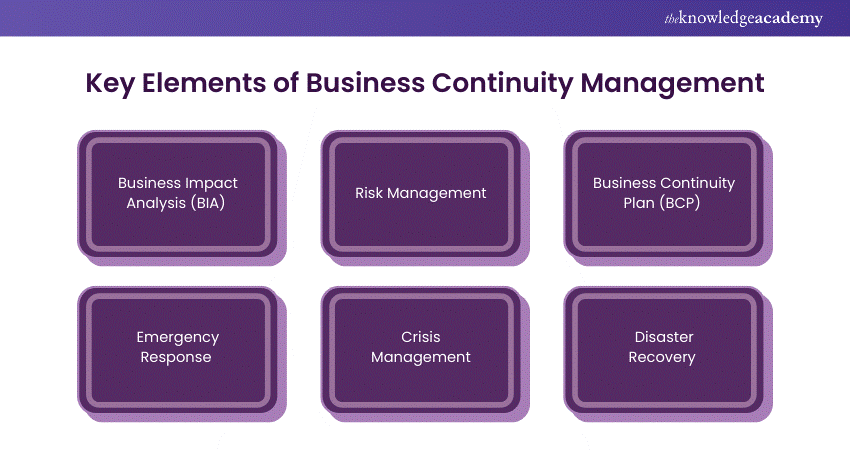
1) Business Impact Analysis (BIA)
Business Impact Analysis (BIA) is the process of identifying the potential impacts of disruptions on an organisation's operations, resources, and objectives. BIA lays the foundation for developing strategies to minimise risks and ensure the delivery of critical products and services.
By conducting an in-depth BIA, companies can clearly identify vital functions, adjust recovery priorities, and allocate resources effectively. This enhances resilience and supports long-term sustainability.
2) Risk Management
Effective risk management is a crucial element of BCM. It involves identifying, assessing, and mitigating potential risks to prepare the business for crises. This includes analysing internal and external threats, implementing safeguards, and creating contingency plans.
A strong risk management strategy enhances business resilience, reduces downtime, and ensures the continuity of important operations, even in challenging circumstances.
3) Business Continuity Plan (BCP)
A Business Continuity Plan (BCP) is a detailed strategy outlining how an organisation will recover from various risks and disasters. Regular testing, reviewing, and updating of the BCP are essential to accommodate changes within the organisation, technology, and the business environment.
An effective BCP minimises time, financial, and reputational losses during disruptions, whether from natural disasters or cyber-attacks.
4) Emergency Response
Developing a structured emergency response plan is critical for effective crisis management. This plan includes identifying emergency response teams, critical assets, and resources.
A well-structured emergency plan enables organisations to coordinate prompt and effective responses, minimising disruptions and ensuring the safety of employees and customers while maintaining Business Continuity.
5) Crisis Management
Crisis management involves proactive planning and executing effective responses to emergencies, reducing their impact on critical functions. It enhances an organisation's ability to adapt and remain operational during major disruptions.
By integrating crisis management into their operations, businesses can protect assets and maintain customer service during disasters or significant incidents.
6) Disaster Recovery
Disaster recovery is at the heart of BCM and involves policies, procedures, and strategies to protect critical data, systems, and operations during disasters.
Effective disaster recovery planning reduces recovery time by identifying critical functions and implementing robust data backup and storage solutions. Clear communication lines are also essential to coordinate emergency responses effectively.
Ensure your Business Stays Operational! Join our ISO 22301 Certified Business Continuity Management Training today.
Phases of Business Continuity Management
BCM involves several phases that enable organisations to maintain operations during disruptions. Here's a look at these phases:
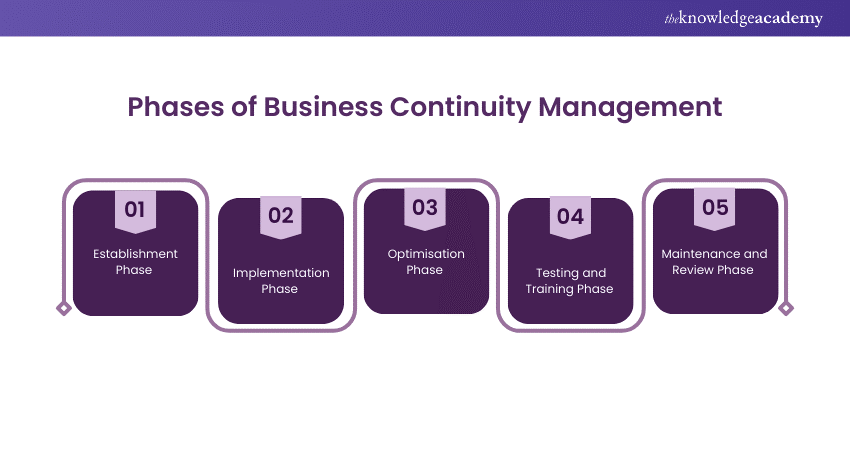
1) Establishment Phase
The establishment phase sets the foundation for Business Continuity Management. This phase involves three key processes:
1) Defining the continuity objectives of the organisation.
2) Determining the critical functions and resources.
3) Laying out a governance structure that oversees the initiative on BCM.
By effectively addressing these elements, the organisation ensures that its BCM strategy aligns with its strategic priorities and operational needs. The Establishment Phase is a vital first step in creating a comprehensive and efficient BCM strategy.
2) Implementation Phase
The implementation phase involves putting the continuity plan into action and testing its effectiveness. This requires detailed planning, clear communication, and ongoing monitoring of crisis readiness.
This phase is where the continuity strategy is truly tested. Prioritising implementation ensures that the organisation can withstand disruptions and continue serving customers, regardless of future challenges.
3) Optimisation Phase
The optimisation phase focuses on refining and improving continuity strategies. During this phase, plans are regularly reviewed and tested for efficiency, with enhancements made to improve resistance and recovery during crises.
Only through rigorous optimisation can the BCM system guarantee the protection of operations and reputation. This phase is dynamic and ensures that the business remains agile, adaptive, and resilient to changing challenges.
4) Testing and Training Phase
The Testing and Training Phase involves exercising continuity plans through realistic scenarios at the organisational level. This process helps identify any gaps, refine strategies, and empower staff to respond effectively to disruptions.
Rigorous testing and training foster a culture of preparedness, making the organisation more agile and confident in facing difficult situations. This phase provides a holistic framework for ensuring the continuity of operations.
5) Maintenance and Review Phase
The Maintenance and Review Phase is an integral part of the broader BCM process. During this phase, the BCM plan undergoes periodic reviews to ensure it remains relevant and effective in the face of changing organisational requirements.
Maintaining the plan requires dedicated resources and management controls. Proper maintenance and review of the BCM plan ensure the best protection of operations, reputation, and mitigation against undesirable impacts.
Discover how to keep your business running in any crisis with our ISO 22301 Lead Implementer Course.
Difference Between BCP and BCM
While BCP and BCM are often used interchangeably, they refer to different concepts in organisational resilience. Here's a comparison:
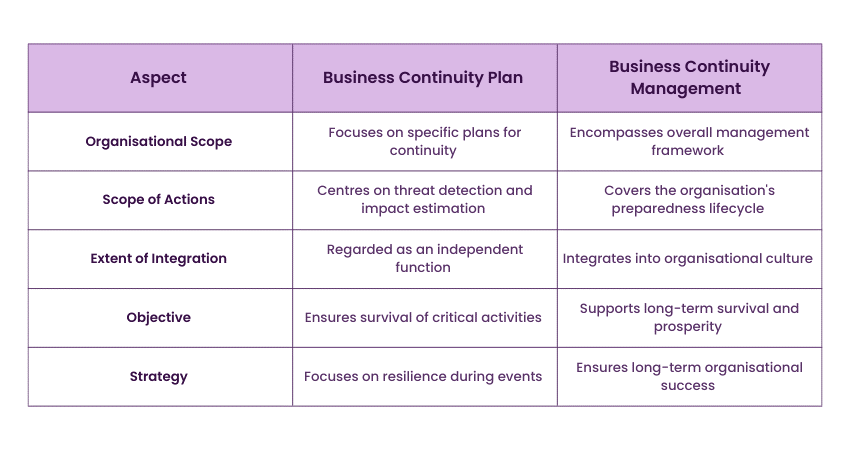
Don't let disaster strike. Get prepared with ISO 22301 Foundation Training today!
Conclusion
Business Continuity Management isn’t just a trendy term; it’s essential for thriving in today’s unpredictable business landscape. So, What is Business Continuity Management? It’s a comprehensive approach that helps organisations pinpoint potential risks, craft contingency plans, and fortify their resilience. By adopting a robust BCM framework, organisations ensure they not only survive but also thrive amidst challenges.
Frequently Asked Questions

Business Continuity Management aims to protect an organisation from risks, ensure customer satisfaction, and reduce downtime and recovery costs during incidents.

Ensuring Business Continuity involves identifying potential weaknesses, assessing threats, and developing strategies to maintain operations and protect assets and reputation.

The Knowledge Academy takes global learning to new heights, offering over 30,000 online courses across 490+ locations in 220 countries. This expansive reach ensures accessibility and convenience for learners worldwide.
Alongside our diverse Online Course Catalogue, encompassing 17 major categories, we go the extra mile by providing a plethora of free educational Online Resources like News updates, Blogs, videos, webinars, and interview questions. Tailoring learning experiences further, professionals can maximise value with customisable Course Bundles of TKA.

The Knowledge Academy’s Knowledge Pass, a prepaid voucher, adds another layer of flexibility, allowing course bookings over a 12-month period. Join us on a journey where education knows no bounds.

The Knowledge Academy offers various Business Continuity Training Courses, including Certified Business Continuity Management Professional (CBCMP). This course caters to different skill levels, providing comprehensive insights into Business Continuity Plan.
Our Business Improvement Blogs cover a range of topics related to Business Continuity Management, offering valuable resources, best practices, and industry insights. Whether you are a beginner or looking to advance your Knowledge of Business Continuity, The Knowledge Academy's diverse courses and informative blogs have got you covered.
Upcoming Business Improvement Resources Batches & Dates
Date
 Certified Business Continuity Management Professional (CBCMP)
Certified Business Continuity Management Professional (CBCMP)
Mon 13th Jan 2025
Mon 28th Apr 2025
Mon 11th Aug 2025
Mon 10th Nov 2025







 Top Rated Course
Top Rated Course



 If you wish to make any changes to your course, please
If you wish to make any changes to your course, please


